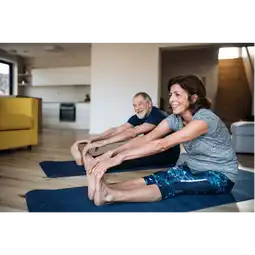As we transition from the youthful exuberance of our early years into the wisdom-laden years of middle age, our bodies embark on a natural metamorphosis, marked by a series of physical changes that can impact our abilities, energy levels, and overall well-being. While these changes are an inevitable part of the aging process, they do not have to define or limit our lives. By understanding the physical transformations of middle age and adopting healthy lifestyle habits, we can effectively navigate this transformative phase and continue to experience a sense of vitality, fulfillment, and well-being.

The Spectrum of Physical Changes During Middle Age: A Tapestry of Adaptation
The physical changes that accompany middle age manifest in diverse ways, varying among individuals and influenced by a multitude of factors, including genetics, lifestyle choices, and environmental influences. Some of the common physical changes that occur during this stage of life include:
Decreased Muscle Mass and Strength: With the passage of time, our bodies undergo a gradual decline in muscle mass, a phenomenon known as sarcopenia. This loss of muscle mass, often accompanied by a decrease in muscle strength, can lead to fatigue, reduced mobility, and an increased risk of falls.
Changes in Body Composition: As we transition into middle age, our bodies often experience a redistribution of body fat, with a tendency for more fat to accumulate around the abdominal region. This shift in body composition, known as central fat accumulation, can increase the risk of developing health complications such as heart disease, type 2 diabetes, and certain types of cancer.
Bone Density Changes: Over time, our bones undergo a natural process of bone density loss, making them more susceptible to fractures. This gradual decline in bone mineral density, particularly prevalent among women, can lead to osteoporosis, a condition characterized by weak and brittle bones.
Metabolic Changes: The body's metabolic processes, responsible for converting food into energy, tend to slow down with age. This metabolic slowdown, often accompanied by a decrease in physical activity, can contribute to weight gain and make it more challenging to maintain a healthy weight.
Sensory Changes: Middle age may bring about subtle changes in our sensory perception, such as a decline in vision, hearing, and taste. These changes, while not always significant, can impact our daily activities and quality of life.
Embracing Healthy Habits: A Foundation for Vitality and Well-being
While the physical transformations of middle age are inevitable, we have the power to minimize their impact and maintain a healthy and fulfilling life by adopting a holistic approach that encompasses physical health, mental well-being, and social connections. Here are some key lifestyle habits to embrace:
Regular Exercise: A Vital Component of Health
Engage in regular physical activity to counteract the loss of muscle mass and strength, maintain bone density, and enhance overall health. Aim for at least 150 minutes of moderate-intensity exercise or 75 minutes of vigorous-intensity exercise per week. Incorporate weight-bearing exercises to strengthen bones and resistance training to build muscle mass.
Nutrition: A Nourishing Approach to Fueling Your Body
Adopt a balanced and nutritious diet rich in fruits, vegetables, whole grains, and lean protein sources. Limit processed foods, sugary drinks, and unhealthy fats. Ensure adequate intake of calcium and vitamin D to support bone health.
Weight Management: A Path to Optimal Wellness
Maintain a healthy weight by balancing your calorie intake with physical activity. Excess weight can exacerbate many of the physical changes associated with middle age. Aim for a healthy weight range to reduce the risk of chronic diseases and improve overall well-being.
Stress Management: A Crucial Aspect of Self-care
Effectively manage stress, as chronic stress can contribute to weight gain, impair sleep, and increase the risk of health problems. Find healthy ways to manage stress, such as yoga, meditation, spending time in nature, or pursuing hobbies that bring you joy.
Regular Check-ups: A Proactive Approach to Health
Schedule regular check-ups with your healthcare provider to monitor your overall health, address any concerns, and receive personalized recommendations. Preventive care plays a vital role in early detection and management of potential health issues.
Additional Tips for Enhancing Your Middle Age Experience
In addition to adopting healthy lifestyle habits, here are some additional tips to further enhance your middle-age experience:
Embrace Your Changing Body: A Journey of Self-acceptance
Instead of resisting the natural changes your body undergoes, embrace them as a part of the aging process. Focus on maintaining overall health and well-being rather than striving for an unattainable ideal. Appreciate the unique experiences and wisdom that middle age brings.
Discover New Hobbies and Interests: A Spark of Joy
Explore new activities that ignite your passion and creativity. Middle age is a great time to pursue new interests, whether it's learning a new language, taking up a new sport, or volunteering in your community.
Nurture Your Relationships: A Source of Strength and Support
Strong social connections are essential for emotional well-being. Make time for the people who matter most to you, and let them know how much you care.
Take Care of Your Mind: A Path to Mental Clarity
Regular mental stimulation, such as reading, learning a new skill, or playing games, can help to keep your mind sharp and active.
Give Back to Others: A Sense of Purpose
Volunteering your time or talents to a cause you care about can provide a sense of purpose and fulfillment.
Navigating the physical changes of middle age is a journey of transformation and growth. By adopting healthy lifestyle habits, embracing self-acceptance, and pursuing personal growth, we can transform this transformative phase into a time of vitality, fulfillment, and continued well-being.




